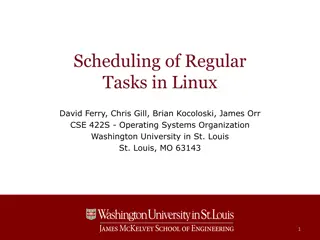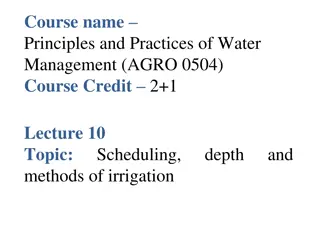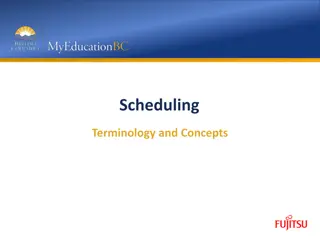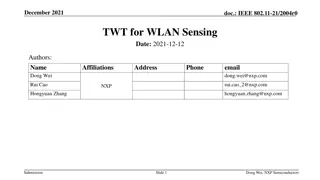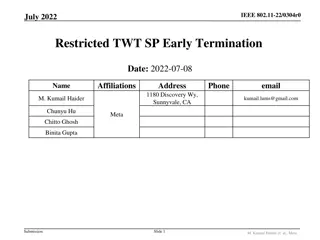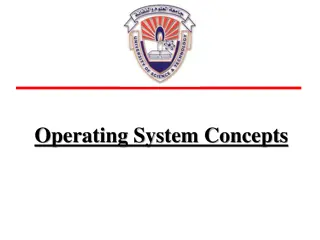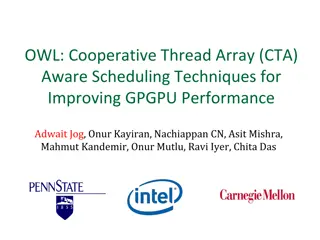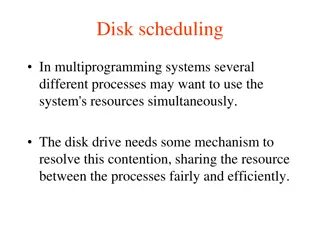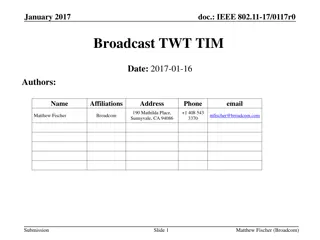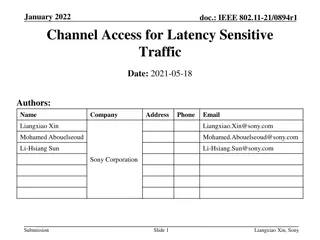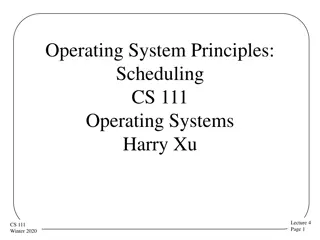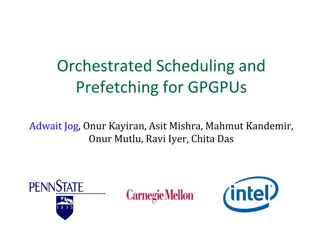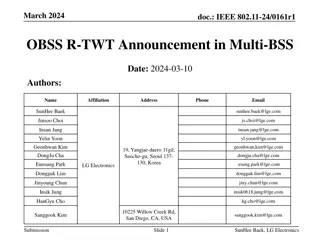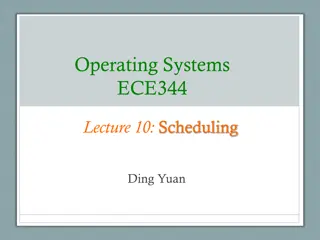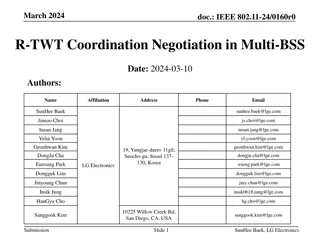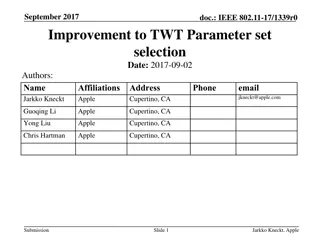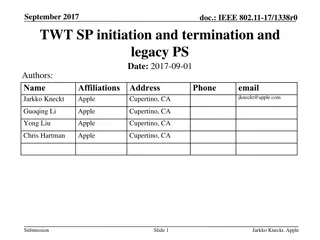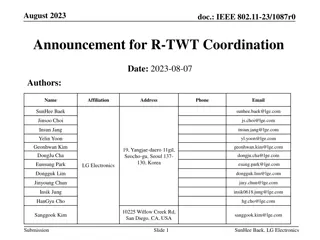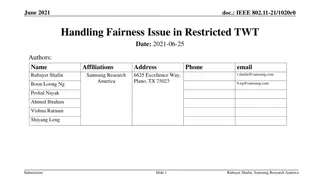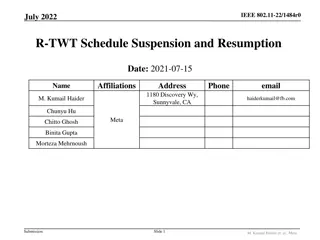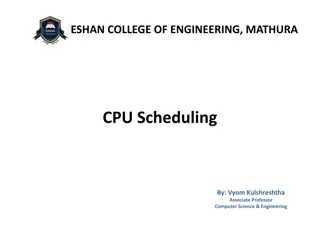Coordinated R-TWT Protection in Multi-BSS
The protection of Restricted Transmitting Using Time Window (R-TWT) service periods in a multi-BSS environment, where overlapping BSSs can affect the latency-sensitive traffic exchange. It proposes methods to coordinate R-TWT service periods and receive schedule information for neighboring BSSs.
3 views • 11 slides
Enhancing Student Success through Block Scheduling at KSU
National Institute for Student Success (NISS) diagnostic analysis at KSU shows the importance of block scheduling in increasing graduation rates and student engagement. Actions to increase registration for full-time schedules and improve student success are underway. The goals of KSU's block schedul
0 views • 10 slides
Understanding Linux Process Scheduling and Priorities
Delve into the intricacies of process scheduling in Linux systems, covering topics such as task prioritization, process states, scheduler decisions, and important scheduling scenarios. Learn about traditional scheduling concerns like throughput and latency, as well as different types of workloads su
3 views • 19 slides
Understanding Irrigation Scheduling for Optimal Crop Yield
Scientific irrigation scheduling plays a vital role in determining the correct timing and quantity of water application for crops to enhance yields efficiently while preserving soil quality. Various criteria are utilized in irrigation scheduling, such as potential evapotranspiration (PET) estimation
13 views • 58 slides
Enhanced Scheduling Method for Low Latency Traffic in IEEE 802.11-24/0091r1
This document presents an enhanced scheduling method for handling low latency traffic in IEEE 802.11 networks. It focuses on supporting deterministic and event-based latency-sensitive traffic, addressing challenges in scheduling and resource allocation. The proposed method aims to improve the reliab
8 views • 12 slides
Enhancing R-TWT with Multi-AP Coordination in IEEE 802.11 Networks
Delve into the world of IEEE 802.11 wireless networks as this document explores solutions for multi-AP coordination for R-TWT, focusing on improving tail latency, jitter, and medium protection. Enhancements in R-TWT operation, coordination scenarios, and solutions for multi-AP deployments are discus
1 views • 12 slides
Understanding Scheduling Terminology and Concepts in MyEdBC
Explore the key terminology and concepts related to scheduling in MyEdBC, including the Build view, scenarios, flat and rotated schedules, patterns, and base terms. Get insights into setting up scheduling structures and preferences, as well as managing course requests and staff information. Enhance
1 views • 13 slides
IEEE 802.11-21/2004r0 Target Wake Time (TWT) for WLAN Sensing
This technical document delves into the implementation of Target Wake Time (TWT) in wireless local area networks (WLAN) for efficient power management in sensing devices. It explores the significance of TWT in minimizing contention among stations, reducing power consumption, and optimizing wake sche
0 views • 14 slides
GPU Scheduling Strategies: Maximizing Performance with Cache-Conscious Wavefront Scheduling
Explore GPU scheduling strategies including Loose Round Robin (LRR) for maximizing performance by efficiently managing warps, Cache-Conscious Wavefront Scheduling for improved cache utilization, and Greedy-then-oldest (GTO) scheduling to enhance cache locality. Learn how these techniques optimize GP
0 views • 21 slides
Enhancements for TWT SP Early Termination in IEEE 802.11-22/0304r0
In the IEEE 802.11-22/0304r0 document, enhancements are proposed for supporting latency-sensitive traffic by introducing additional improvements to the TWT SP early termination feature. These enhancements aim to facilitate efficient termination of the restricted TWT SP, allowing STAs to enter the do
0 views • 17 slides
Time-Aware Scheduling Capabilities in IEEE 802.11be
Describing necessary enhancements to enable Time-Aware Scheduling in IEEE 802.11be for time-sensitive applications. The focus is on aligning with the 802.1Qbv standard to address latency, jitter, and reliability issues, presenting a structured outline of requirements and configurations essential for
0 views • 24 slides
Understanding Scheduling Algorithms in Operating Systems
Exploring the world of scheduling in operating systems, this content covers various aspects such as introduction to scheduling, process behavior, bursts of CPU usage, CPU-bound and I/O-bound processes, when to schedule processes, and the differences between non-preemptive and preemptive scheduling a
0 views • 34 slides
IEEE 802.11-21/1656r0: Primary and Secondary User in R-TWT
In October 2021, the document IEEE 802.11-21/1656r0 discusses the usage of R-TWT for low-latency services in 11be TGbe networks. It addresses the coexistence with legacy STAs, transmission delays, and the design challenges related to R-TWT service periods. Various related submissions and CIDs are hi
0 views • 15 slides
Understanding CPU Scheduling in Operating Systems
In a single-processor system, processes take turns running on the CPU. The goal of multiprogramming is to keep the CPU busy at all times. CPU scheduling relies on the alternating CPU and I/O burst cycles of processes. The CPU scheduler selects processes from the ready queue to execute when the CPU i
1 views • 26 slides
Improving GPGPU Performance with Cooperative Thread Array Scheduling Techniques
Limited DRAM bandwidth poses a critical bottleneck in GPU performance, necessitating a comprehensive scheduling policy to reduce cache miss rates, enhance DRAM bandwidth, and improve latency hiding for GPUs. The CTA-aware scheduling techniques presented address these challenges by optimizing resourc
0 views • 33 slides
Simplifying Residency Shift Scheduling with Mathematical Programming Techniques
This project, led by Professor Amy Cohn and William Pozehl, aims to demonstrate how mathematical programming techniques can simplify the complex task of residency shift scheduling. The Residency Shift Scheduling Game highlights the challenges of manual scheduling and the ease of using mathematical p
1 views • 37 slides
Understanding Disk Scheduling in Multiprogramming Systems
In a multiprogramming system, several processes may contend for disk resources. Disk scheduling aims to efficiently share the disk drive's resources among processes, maximizing I/O request satisfaction while minimizing head movement. Various disk scheduling policies like FCFS, SSTF, and SCAN aim to
1 views • 22 slides
Enhancing 802.11 Scheduling with Broadcast TWT and TIM Mechanisms
The January 2017 document IEEE 802.11-17/0117r0 discusses the implementation of coordinated multi-user downlink and triggered multi-user uplink in 802.11 systems to improve scheduling and reduce collisions. It proposes aligning power saving wake times using Target Wake Time (TWT) for better efficien
1 views • 17 slides
Enhanced AP Coordination in IEEE 802.11 Networks
The document discusses the implementation of Restricted Transmit Wait Time (R-TWT) scheduling in IEEE 802.11 networks. It covers topics such as AP coordination, announcement of R-TWT schedules by APs, usage of 1-hop and 2-hop neighbor information for scheduling, and STA's notification of neighbor AP
0 views • 7 slides
Proposal for R-TWT Protection in IEEE 802.11-23/2212r1 11bn
A detailed discussion on considerations and proposals for R-TWT Signal Protection in 11bn networks is provided in this document. It covers topics like protection between neighboring APs, different OBSS R-TWT SPs for STAs, proposals for APs and STAs in a BSS, concluding with the importance of conside
0 views • 6 slides
Enhancing Channel Access for Latency-Sensitive Traffic in January 2022
In the documentation IEEE 802.11-21/0894r1, the focus is on improving channel access for latency-sensitive traffic through concepts like Restricted TWT (Target Wake Time). The proposal suggests methods to protect TWT Service Periods from non-TWT scheduled STAs, ensuring prioritized transmission of l
0 views • 11 slides
Understanding Operating System Scheduling Principles
Operating system scheduling involves making decisions on resource allocation among multiple clients, determining who gets to use the resource next and for how long. Different scheduling algorithms aim to achieve specific goals, such as maximizing throughput, minimizing waiting time, ensuring fairnes
0 views • 57 slides
Orchestrated Scheduling and Prefetching for GPGPUs
This paper discusses the implementation of an orchestrated scheduling and prefetching mechanism for GPGPUs to enhance system performance by improving IPC and overall warp scheduling policies. It presents a prefetch-aware warp scheduler proposal aiming to make a simple prefetcher more capable, result
0 views • 46 slides
Efficient Department Scheduling for Timetabling Success
Efficient timetabling for a department involves various stages like data entry, draft timetable creation, feedback collection, production of the final timetable, schedule adjustments, and publication. Key information needed includes faculty availability, room inventory, specific scheduling parameter
0 views • 59 slides
IEEE 802.11-24/0161r1 OBSS R-TWT Announcement in Multi-BSS
The document discusses the coordination of R-TWT schedules in Multi-BSS to enhance operation and protection. It covers how APs announce OBSS R-TWT schedules to associated STAs, ensuring efficient transmission of latency-sensitive traffic. Methods for announcing OBSS R-TWT schedules to EHT STAs and U
0 views • 13 slides
Understanding Scheduling in Operating Systems: A Comprehensive Overview
This content delves into the intricate details of scheduling in operating systems, covering the goals, various scheduling algorithms, multiprogramming concepts, decision-making processes for resource allocation, timing considerations, scheduling objectives, and performance criteria such as throughpu
0 views • 42 slides
R-TWT Coordination Negotiation in Multi-BSS Networks
This document discusses the coordination negotiation process for R-TWT schedules in Multi-BSS networks to minimize interference between Access Points (APs). It outlines the overview, signaling methods, and importance of coordinated R-TWT schedules in improving network efficiency.
0 views • 16 slides
Enhancement of TWT Parameter Set Selection in September 2017
Submission in September 2017 proposes improvements in TWT parameter selection for IEEE 802.11 networks. It allows TWT requesting STAs to signal repeat times, enhancing transmission reliability and reducing overheads. Non-AP STA challenges and current TWT setup signaling are addressed, providing a me
0 views • 12 slides
IEEE 802.11-17/1338r0 - September 2017 TWT SP Initiation and Termination
This document, authored by Jarkko Kneckt from Apple, discusses the September 2017 TWT SP initiation and termination processes, focusing on high throughput and power efficiency for 802.11ax devices. Legacy power save mechanisms in parallel with TWT mechanisms are explored, along with issues related t
0 views • 15 slides
Announcement of OBSS R-TWT Coordination in Multi-BSS Environment
The document discusses the coordination of R-TWT service periods (SPs) in a Multi-BSS environment, focusing on addressing limitations in the exchange of latency-sensitive traffic in adjacent BSSs. It explores methods for coordinating R-TWT SPs among multiple APs to protect the intended SPs within ea
0 views • 9 slides
Handling Fairness Issue in Restricted TWT Operation
Proposal addressing fairness vs. channel utilization tradeoff in restricted Target Wake Time (TWT) operation for IEEE 802.11 networks. Solution suggested for underutilization of TWT schedules due to early completion of latency-sensitive transmissions, mitigating fairness concerns while optimizing ch
0 views • 14 slides
College of Medicine M4 Scheduling Information for Class of 2021
Important scheduling timeline information for 4th-year medical students at the College of Medicine. Key dates include deadlines for hardship requests, core clerkship preferences, Geriatrics/Palliative Medicine enrollment, scheduling rounds, and publication rules. Compliance with specific requirement
0 views • 8 slides
Improving Job Scheduling with Nudge Policy
Explore the innovative Nudge policy for stochastic improvement upon First-Come-First-Served (FCFS) scheduling. The Nudge policy introduces a new approach with better performance tradeoffs compared to traditional scheduling methods. Discover how Nudge outperforms FCFS across various job size distribu
0 views • 21 slides
Job Scheduling Across Geo-distributed Datacenters
Scheduling jobs across geo-distributed datacenters poses challenges such as optimizing job completion time, reducing data transfer costs, and coordinating tasks across multiple locations. Various strategies like reordering-based approaches and scheduling heuristics are explored to enhance job schedu
0 views • 32 slides
Insights into Volunteer Scheduling and Management
Exploring the intricacies of volunteer scheduling, this informative guide covers topics such as creating schedule slots, weighing the pros and cons of scheduling, opportunity scheduling, monthly calendars, slot summaries, volunteer and opportunity listings, and more. Dive into the world of volunteer
0 views • 21 slides
IEEE 802.11-22/1484r0 - R-TWT Schedule Suspension and Resumption
For supporting latency-sensitive traffic, the IEEE 802.11-22/1484r0 standard discusses the suspension and resumption of R-TWT schedules. It explores existing signaling for TWT suspension/resumption in R-TWT operation, identifies gaps, and proposes enhancements. The document addresses TWT Information
0 views • 12 slides
University Space Scheduling Guidelines
University space scheduling guidelines prioritize academic courses and campus use, emphasizing the need for more available space. The policy outlines expectations, scheduling guidelines, and the management of laboratory and studio spaces. It also addresses the direct scheduling of such spaces for sp
0 views • 14 slides
Understanding CPU Scheduling Concepts at Eshan College of Engineering, Mathura
Dive into the world of CPU scheduling at Eshan College of Engineering in Mathura with Associate Professor Vyom Kulshreshtha. Explore topics such as CPU utilization, I/O burst cycles, CPU burst distribution, and more. Learn about the CPU scheduler, dispatcher module, scheduling criteria, and the impl
0 views • 18 slides
Overview of Project Scheduling in Engineering Management
The lecture covers planning and scheduling in engineering management, focusing on activity and event scheduling techniques, bar charts, critical path analysis, and addressing project scheduling principles. It discusses the objectives of the lecture, the difference between planning and scheduling, th
0 views • 29 slides
Discussion on Improving Transmission Efficiency in IEEE 802.11 TWT Mechanism
This document proposes enhancements to the IEEE 802.11 TWT mechanism to address issues related to random access Resource Units (RU) utilization. By defining a mechanism to optimize RU allocation for TWT scheduled STAs, the proposal aims to improve transmission efficiency and power saving, particular
0 views • 11 slides


